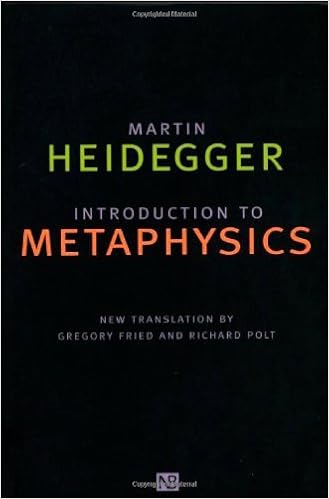
Free eBooks Introduction To Metaphysics (Yale Nota Bene S) Available To Downloads

Heidegger's Introduction to Metaphysics is one of the most important works written by this figure of 20th-century philosophy. The new translation aims to make this work more accessible including provision of conventional translations of Greek passages that Heidegger translated unconventionally.

Series: Yale Nota Bene S
Paperback: 294 pages
Publisher: Yale University Press; New edition edition (August 11, 2000)
Language: English
ISBN-10: 0300083289
ISBN-13: 978-0300083286
Product Dimensions: 7.8 x 5.1 x 0.8 inches
Shipping Weight: 10.4 ounces
Average Customer Review: 4.3 out of 5 stars See all reviews (32 customer reviews)
Best Sellers Rank: #396,941 in Books (See Top 100 in Books) #161 in Books > Politics & Social Sciences > Philosophy > Movements > Existentialism #700 in Books > Politics & Social Sciences > Philosophy > Metaphysics

"Why are there beings at all instead of nothing?" (1) Martin Heidegger, the most poetic and controversial philosopher of the 20th century, cuts straight to the heart of the matter with this very question. The heart of metaphysics is its very ability to question the extra-ordinary - a questioning that is entirely impractical, for "You can't do anything with philosophy" (13). Philosophy as questioning means being in a way that is fundamentally cut off from the technological and scientific tendency towards instrumentalization that has been so endemic in the modern world. This questioning points to the fact that it is in language that we are made and in language the we come to be; in language we come to Being.But, what does it mean to be? This is an ancient question, but it is a question that during the modern era has been entirely lost from the realm of the philosophical. In an almost religious manner, Heidegger claims that we have quite literally "fallen" from the ancient Greeks, who were able to ask that question with all its force and come to recognize in that question a raw reality: truth is about revealing or "unfolding". This "unfolding" that truth *is* should be spoken of as light. Human-Being, then, is a coming into the light that the question of Being is.One can easily become lost in Heidegger's dense, poetic prose. Yet, as one reads what he has to write about language and how we find ourselves *in* it, one begins to suspect that the sheer elegance of his writing is intentional: its goal is to wake us from our modern slumber and get around to asking that fundamental question again. Otherwise we risk falling into the insanity of nihilism that Nietzsche (whom Heidegger engages throughout the work) noted: seeking beings in the oblivion of Being (217).
Let's get the obvious out of the way first. Heidegger's writing can be very difficult and is often torturous. Add to that Heidegger's obvious and overt German nationalism and you've got a challenging book on more than one level.First, Heidegger is engaged in this text in a radical deconstruction of all the traditional ontological categories of Western philosophy as they have existed and been defined for the past two-thousand years, beginning with the most basic concept of all "Being". Because of this Heidegger is completely unable to rely on accepted and traditional categories of thought, and their traditional definitions, in expressing his own thought, and instead has recourse to neologisms such as "the abiding-emerging sway" which defy precise, scientific definition, relying instead on a certain suggestiveness in order to convey their meaning. This makes Heidegger's writing difficult to understand from a technical standpoint especially for those who are used to a certain scientific precision of definition in their concepts, which Heidegger's guiding thoughts definitely lack. And that is not a mere accident that can be easily rectified through a more precise definition of terms but is deeply rooted in Heidegger's philosophy and his notions of being and language.Secondly, Heidegger's work is a challenge because, with the benefit of hindsight, we know precisely where Heidegger's celebration of the German spirit and it's supposed role in a total spiritual rejuvenation of the West, leads. It is almost impossible, therefore, to read certain passages from Heidegger where his German nationalism is most prominently on display without a definite feeling of revulsion.
Introduction to Metaphysics (Yale Nota Bene S) Intuition: Its Powers and Perils (Yale Nota Bene) Cuba: A New History (Yale Nota Bene) The Madwoman in the Attic: The Woman Writer and the Nineteenth-Century Literary Imagination (Yale Nota Bene S) Harvey Cushing, a biography, ([Yale university. School of medicine. Yale medical library. Historical library. Publication) The 1946 and 1953 Yale University Excavations in Trinidad: Vol. # 92 (Yale University Publications in Anthropology) Iniciacion a la Metafisica/ Introduction to Metaphysics (Spanish Edition) La Evaluación en la Danza: Mucho más que poner una nota (Pedagogía de la Danza nº 3) (Spanish Edition) Los mil y un velorios: Crónica de la nota roja en México (Spanish Edition) An Introduction to Spanish for Health Care Workers: Communication and Culture, Third Edition (Yale Language) Lottery: Law Of Attraction: Secret Lottery Strategies and Systems to Effortlessly Manifest: Abundance! (get rich quick, metaphysics, lottery systems, lotto, manifesting, millionare mind) The Kemetic Tree of Life Ancient Egyptian Metaphysics and Cosmology for Higher Consciousness Modal Logic as Metaphysics Brief Peeks Beyond: Critical Essays on Metaphysics, Neuroscience, Free Will, Skepticism and Culture Commentary on Aristotle's Metaphysics [Aristotelian Commentary Series] Grounding for the Metaphysics of Morals: with On a Supposed Right to Lie because of Philanthropic Concerns (Hackett Classics) Strange Wonder: The Closure of Metaphysics and the Opening of Awe (Insurrections: Critical Studies in Religion, Politics, and Culture) Kant: Groundwork of the Metaphysics of Morals Fundamental Principles of the Metaphysics of Morals Metaphysics, a Bridge to Eckankar



